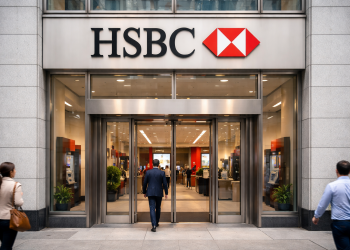Asian markets faced a broad decline on Friday as Japan’s government bond yields surged to levels last seen during the 2008 financial crisis.
The sell-off mirrored Wall Street’s losses overnight, where investor sentiment weakened despite US President Donald Trump’s tariff concessions.
Concerns over rising input costs and economic uncertainty weighed on equities, while Chinese trade data fell short of expectations, adding to regional market jitters.
Asia-Pacific markets slide amid bond yield surge
Japan’s Nikkei 225 led regional losses, plunging 2%, while the Topix index slid 1.51% as investors reacted to a bond sell-off that pushed Japanese government bond (JGB) yields to their highest levels in over a decade.
The 20-year JGB yield climbed to 2.25%, while the 30-year JGB hit 2.556%, reflecting concerns over rising borrowing costs.
In South Korea, the Kospi dipped 0.44%, with the Kosdaq down 0.43% in volatile trading.
Meanwhile, Australia’s S&P/ASX 200 tumbled 1.71%, tracking the broader risk-off sentiment.
Hong Kong’s Hang Seng index bucked the trend, rising 0.56%, while mainland China’s CSI 300 slipped 0.14%.
The Nifty 50 edged up 0.12% in India, and the BSE Sensex remained flat.
China’s exports miss expectations, adding to economic concerns
China’s export growth slowed sharply at the start of the year, with January-February exports rising just 2.3% in US dollar terms, well below market estimates of 5% growth, according to customs data.
This was the weakest growth since April 2023 and a significant drop from the 10.7% expansion seen in December.
The sluggish export performance reflects ongoing trade tensions with the US, where higher tariffs have dampened demand.
Beijing has attempted to counter weak consumer sentiment by doubling subsidies for its trade-in program, which now includes electronics and home appliances.
JD.com stock slides despite strong Q4 revenue
Shares of Chinese e-commerce giant JD.com fell 5% in Hong Kong on Friday, despite reporting a 13.4% year-on-year increase in fourth-quarter revenue, reaching $47.5 billion.
CEO Sandy Xu highlighted a surge in third-party users and order volumes, which outpaced JD’s retail segment growth.
However, broader concerns over China’s sluggish retail environment and deflationary pressures weighed on investor sentiment.
Despite the dip, JD.com’s stock remains up 26.1% year-to-date in Hong Kong, supported by strong performance in its electronics and home appliances segment, which saw 15.8% annual growth.
Japanese yen volatility prompts intervention warning
Japan’s Finance Minister Katsunobu Kato issued a warning on Friday, stating that authorities would take “appropriate action” if speculative moves continued to drive currency fluctuations.
The Japanese yen traded 0.28% lower at 147.53 per U.S. dollar, after briefly hitting a five-month high earlier in the week.
“We’ve seen one-sided, rapid movements since December,” Kato told reporters, reinforcing the government’s stance on preventing excessive volatility in the foreign exchange market.
Defense stocks in Japan, South Korea rise on NATO tensions
Amid the broader market slump, defense stocks in Japan and South Korea surged, as Donald Trump renewed threats against NATO.
The former US president warned that countries failing to meet their defense spending targets would not be defended by the US, fueling speculation of increased military spending.
South Korea’s Hanwha Aerospace, Korea Aerospace Industries, Poongsan, and Hyundai Rotem saw gains, while Japan’s Mitsubishi Heavy Industries, Hosoya Pyro-Engineering, and Kawasaki Heavy Industries also rose.
Global markets react to Wall Street losses
Overnight, Wall Street saw sharp declines, with the Nasdaq Composite tumbling 2.61%, entering correction territory after falling more than 10% from its recent high.
The S&P 500 slid 1.78%, while the Dow Jones Industrial Average lost 0.99%.
The losses came as investors reacted to the Federal Reserve’s Beige Book report, which signaled concerns about rising input costs and economic uncertainty, exacerbated by Trump’s trade policies.
The post Asia markets tumble as Japan bond yields hit highest levels since 2008 appeared first on Invezz







